LSC UoS - Contemporary Management Issues: Causation and Effectuation
VerifiedAdded on 2023/06/14
|7
|1983
|148
Essay
AI Summary
This essay contrasts causation and effectuation approaches in entrepreneurship and their relevance to uncertain business management issues in the global environment. Causation emphasizes predefined objectives and necessary means, while effectuation focuses on available resources to achieve emergent goals. The essay discusses the impact of globalization and internet usage on business practices, highlighting the limitations of causation in dynamic environments. It further explores the STP model's role in causation and the importance of resource evaluation in effectuation. The report concludes that balancing causation and effectuation principles is crucial for effective management in the 21st century, enabling organizations to be both strategic and opportunistic. Desklib provides access to similar essays and study resources for students.

Contemporary
management issues
21st century
management issues
21st century
Paraphrase This Document
Need a fresh take? Get an instant paraphrase of this document with our AI Paraphraser

Table of Contents
INTRODUCTION ..........................................................................................................................3
TASK ..............................................................................................................................................3
CONCLUSION ...............................................................................................................................6
REFERENCES................................................................................................................................7
INTRODUCTION ..........................................................................................................................3
TASK ..............................................................................................................................................3
CONCLUSION ...............................................................................................................................6
REFERENCES................................................................................................................................7
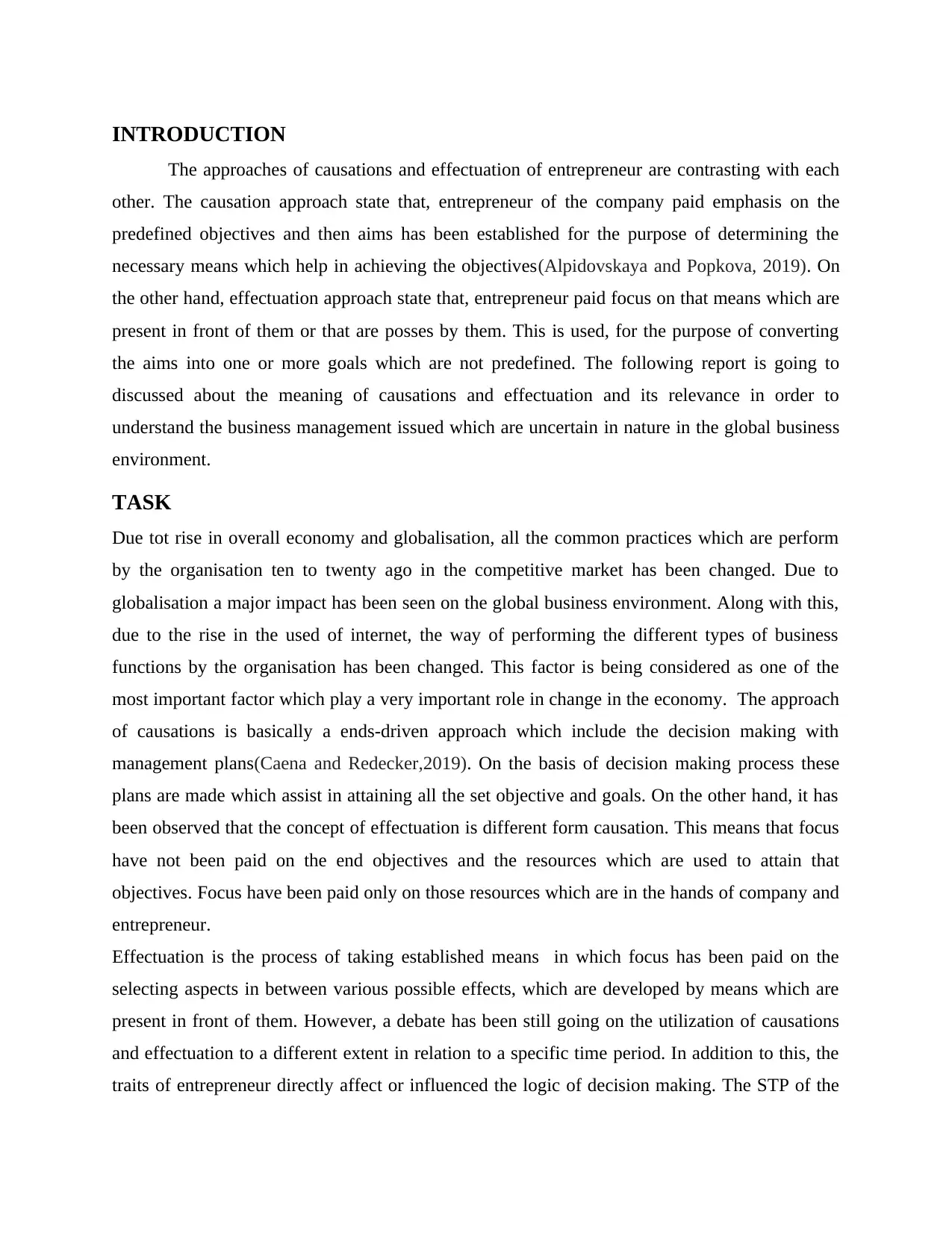
INTRODUCTION
The approaches of causations and effectuation of entrepreneur are contrasting with each
other. The causation approach state that, entrepreneur of the company paid emphasis on the
predefined objectives and then aims has been established for the purpose of determining the
necessary means which help in achieving the objectives(Alpidovskaya and Popkova, 2019). On
the other hand, effectuation approach state that, entrepreneur paid focus on that means which are
present in front of them or that are posses by them. This is used, for the purpose of converting
the aims into one or more goals which are not predefined. The following report is going to
discussed about the meaning of causations and effectuation and its relevance in order to
understand the business management issued which are uncertain in nature in the global business
environment.
TASK
Due tot rise in overall economy and globalisation, all the common practices which are perform
by the organisation ten to twenty ago in the competitive market has been changed. Due to
globalisation a major impact has been seen on the global business environment. Along with this,
due to the rise in the used of internet, the way of performing the different types of business
functions by the organisation has been changed. This factor is being considered as one of the
most important factor which play a very important role in change in the economy. The approach
of causations is basically a ends-driven approach which include the decision making with
management plans(Caena and Redecker,2019). On the basis of decision making process these
plans are made which assist in attaining all the set objective and goals. On the other hand, it has
been observed that the concept of effectuation is different form causation. This means that focus
have not been paid on the end objectives and the resources which are used to attain that
objectives. Focus have been paid only on those resources which are in the hands of company and
entrepreneur.
Effectuation is the process of taking established means in which focus has been paid on the
selecting aspects in between various possible effects, which are developed by means which are
present in front of them. However, a debate has been still going on the utilization of causations
and effectuation to a different extent in relation to a specific time period. In addition to this, the
traits of entrepreneur directly affect or influenced the logic of decision making. The STP of the
The approaches of causations and effectuation of entrepreneur are contrasting with each
other. The causation approach state that, entrepreneur of the company paid emphasis on the
predefined objectives and then aims has been established for the purpose of determining the
necessary means which help in achieving the objectives(Alpidovskaya and Popkova, 2019). On
the other hand, effectuation approach state that, entrepreneur paid focus on that means which are
present in front of them or that are posses by them. This is used, for the purpose of converting
the aims into one or more goals which are not predefined. The following report is going to
discussed about the meaning of causations and effectuation and its relevance in order to
understand the business management issued which are uncertain in nature in the global business
environment.
TASK
Due tot rise in overall economy and globalisation, all the common practices which are perform
by the organisation ten to twenty ago in the competitive market has been changed. Due to
globalisation a major impact has been seen on the global business environment. Along with this,
due to the rise in the used of internet, the way of performing the different types of business
functions by the organisation has been changed. This factor is being considered as one of the
most important factor which play a very important role in change in the economy. The approach
of causations is basically a ends-driven approach which include the decision making with
management plans(Caena and Redecker,2019). On the basis of decision making process these
plans are made which assist in attaining all the set objective and goals. On the other hand, it has
been observed that the concept of effectuation is different form causation. This means that focus
have not been paid on the end objectives and the resources which are used to attain that
objectives. Focus have been paid only on those resources which are in the hands of company and
entrepreneur.
Effectuation is the process of taking established means in which focus has been paid on the
selecting aspects in between various possible effects, which are developed by means which are
present in front of them. However, a debate has been still going on the utilization of causations
and effectuation to a different extent in relation to a specific time period. In addition to this, the
traits of entrepreneur directly affect or influenced the logic of decision making. The STP of the
⊘ This is a preview!⊘
Do you want full access?
Subscribe today to unlock all pages.

Trusted by 1+ million students worldwide
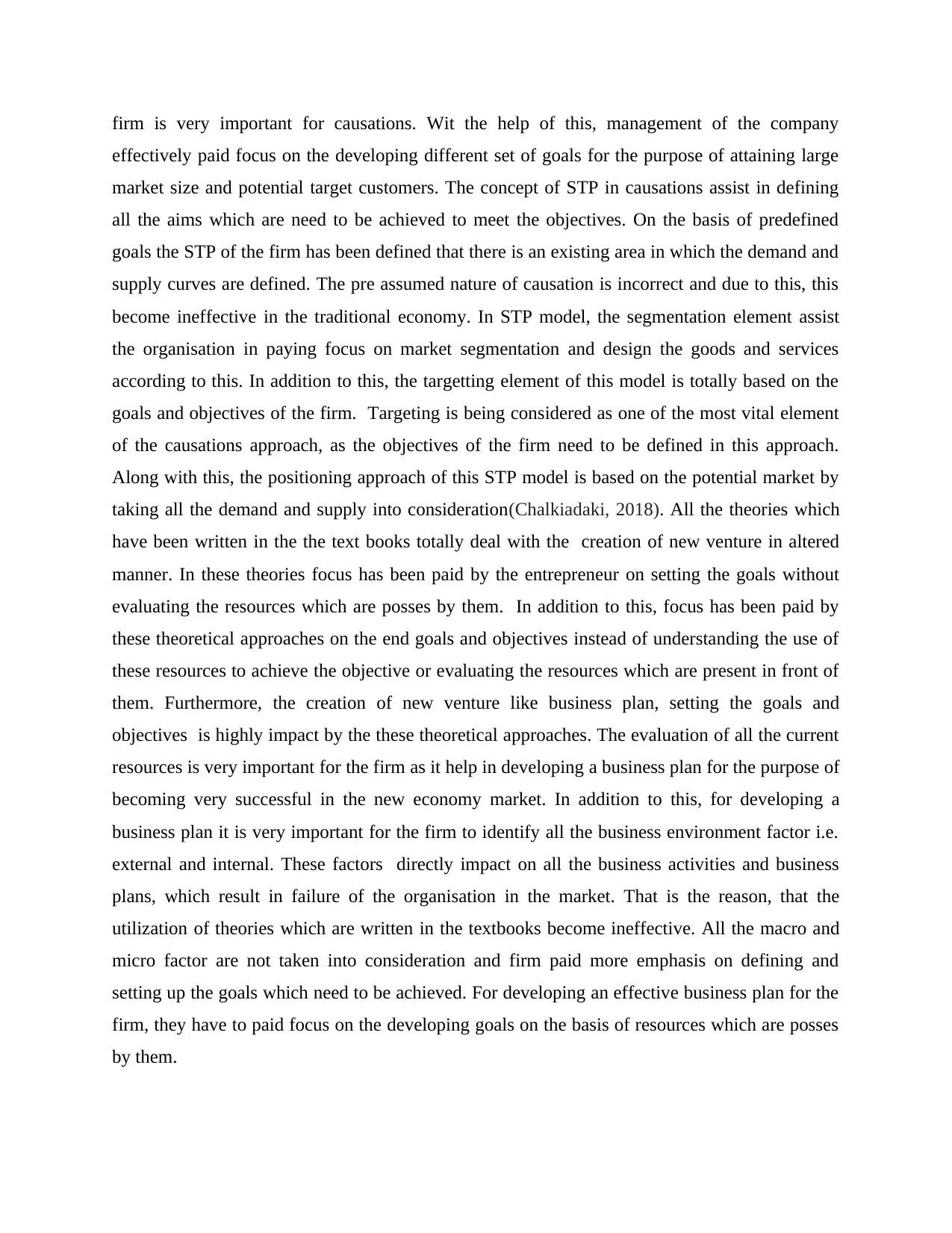
firm is very important for causations. Wit the help of this, management of the company
effectively paid focus on the developing different set of goals for the purpose of attaining large
market size and potential target customers. The concept of STP in causations assist in defining
all the aims which are need to be achieved to meet the objectives. On the basis of predefined
goals the STP of the firm has been defined that there is an existing area in which the demand and
supply curves are defined. The pre assumed nature of causation is incorrect and due to this, this
become ineffective in the traditional economy. In STP model, the segmentation element assist
the organisation in paying focus on market segmentation and design the goods and services
according to this. In addition to this, the targetting element of this model is totally based on the
goals and objectives of the firm. Targeting is being considered as one of the most vital element
of the causations approach, as the objectives of the firm need to be defined in this approach.
Along with this, the positioning approach of this STP model is based on the potential market by
taking all the demand and supply into consideration(Chalkiadaki, 2018). All the theories which
have been written in the the text books totally deal with the creation of new venture in altered
manner. In these theories focus has been paid by the entrepreneur on setting the goals without
evaluating the resources which are posses by them. In addition to this, focus has been paid by
these theoretical approaches on the end goals and objectives instead of understanding the use of
these resources to achieve the objective or evaluating the resources which are present in front of
them. Furthermore, the creation of new venture like business plan, setting the goals and
objectives is highly impact by the these theoretical approaches. The evaluation of all the current
resources is very important for the firm as it help in developing a business plan for the purpose of
becoming very successful in the new economy market. In addition to this, for developing a
business plan it is very important for the firm to identify all the business environment factor i.e.
external and internal. These factors directly impact on all the business activities and business
plans, which result in failure of the organisation in the market. That is the reason, that the
utilization of theories which are written in the textbooks become ineffective. All the macro and
micro factor are not taken into consideration and firm paid more emphasis on defining and
setting up the goals which need to be achieved. For developing an effective business plan for the
firm, they have to paid focus on the developing goals on the basis of resources which are posses
by them.
effectively paid focus on the developing different set of goals for the purpose of attaining large
market size and potential target customers. The concept of STP in causations assist in defining
all the aims which are need to be achieved to meet the objectives. On the basis of predefined
goals the STP of the firm has been defined that there is an existing area in which the demand and
supply curves are defined. The pre assumed nature of causation is incorrect and due to this, this
become ineffective in the traditional economy. In STP model, the segmentation element assist
the organisation in paying focus on market segmentation and design the goods and services
according to this. In addition to this, the targetting element of this model is totally based on the
goals and objectives of the firm. Targeting is being considered as one of the most vital element
of the causations approach, as the objectives of the firm need to be defined in this approach.
Along with this, the positioning approach of this STP model is based on the potential market by
taking all the demand and supply into consideration(Chalkiadaki, 2018). All the theories which
have been written in the the text books totally deal with the creation of new venture in altered
manner. In these theories focus has been paid by the entrepreneur on setting the goals without
evaluating the resources which are posses by them. In addition to this, focus has been paid by
these theoretical approaches on the end goals and objectives instead of understanding the use of
these resources to achieve the objective or evaluating the resources which are present in front of
them. Furthermore, the creation of new venture like business plan, setting the goals and
objectives is highly impact by the these theoretical approaches. The evaluation of all the current
resources is very important for the firm as it help in developing a business plan for the purpose of
becoming very successful in the new economy market. In addition to this, for developing a
business plan it is very important for the firm to identify all the business environment factor i.e.
external and internal. These factors directly impact on all the business activities and business
plans, which result in failure of the organisation in the market. That is the reason, that the
utilization of theories which are written in the textbooks become ineffective. All the macro and
micro factor are not taken into consideration and firm paid more emphasis on defining and
setting up the goals which need to be achieved. For developing an effective business plan for the
firm, they have to paid focus on the developing goals on the basis of resources which are posses
by them.
Paraphrase This Document
Need a fresh take? Get an instant paraphrase of this document with our AI Paraphraser
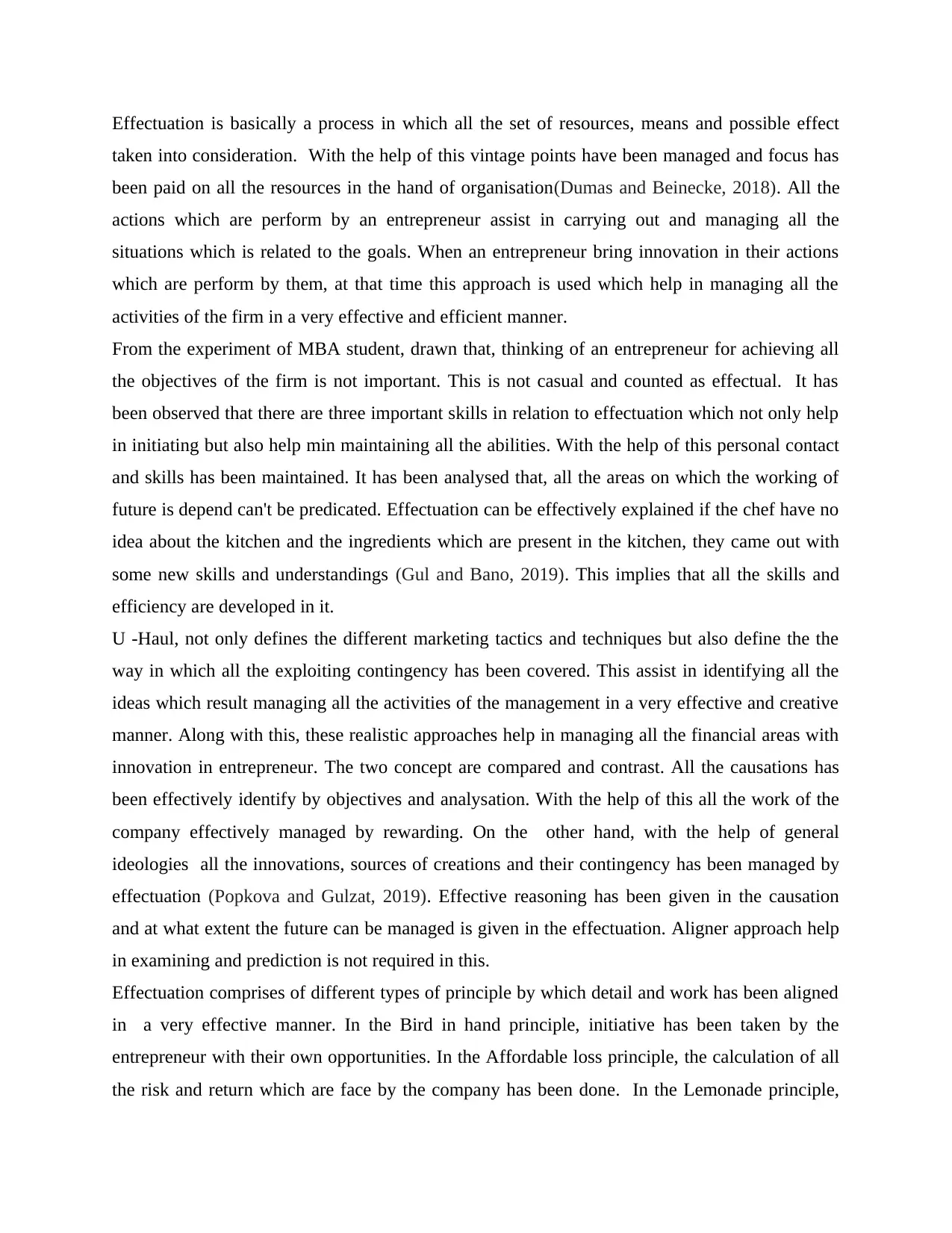
Effectuation is basically a process in which all the set of resources, means and possible effect
taken into consideration. With the help of this vintage points have been managed and focus has
been paid on all the resources in the hand of organisation(Dumas and Beinecke, 2018). All the
actions which are perform by an entrepreneur assist in carrying out and managing all the
situations which is related to the goals. When an entrepreneur bring innovation in their actions
which are perform by them, at that time this approach is used which help in managing all the
activities of the firm in a very effective and efficient manner.
From the experiment of MBA student, drawn that, thinking of an entrepreneur for achieving all
the objectives of the firm is not important. This is not casual and counted as effectual. It has
been observed that there are three important skills in relation to effectuation which not only help
in initiating but also help min maintaining all the abilities. With the help of this personal contact
and skills has been maintained. It has been analysed that, all the areas on which the working of
future is depend can't be predicated. Effectuation can be effectively explained if the chef have no
idea about the kitchen and the ingredients which are present in the kitchen, they came out with
some new skills and understandings (Gul and Bano, 2019). This implies that all the skills and
efficiency are developed in it.
U -Haul, not only defines the different marketing tactics and techniques but also define the the
way in which all the exploiting contingency has been covered. This assist in identifying all the
ideas which result managing all the activities of the management in a very effective and creative
manner. Along with this, these realistic approaches help in managing all the financial areas with
innovation in entrepreneur. The two concept are compared and contrast. All the causations has
been effectively identify by objectives and analysation. With the help of this all the work of the
company effectively managed by rewarding. On the other hand, with the help of general
ideologies all the innovations, sources of creations and their contingency has been managed by
effectuation (Popkova and Gulzat, 2019). Effective reasoning has been given in the causation
and at what extent the future can be managed is given in the effectuation. Aligner approach help
in examining and prediction is not required in this.
Effectuation comprises of different types of principle by which detail and work has been aligned
in a very effective manner. In the Bird in hand principle, initiative has been taken by the
entrepreneur with their own opportunities. In the Affordable loss principle, the calculation of all
the risk and return which are face by the company has been done. In the Lemonade principle,
taken into consideration. With the help of this vintage points have been managed and focus has
been paid on all the resources in the hand of organisation(Dumas and Beinecke, 2018). All the
actions which are perform by an entrepreneur assist in carrying out and managing all the
situations which is related to the goals. When an entrepreneur bring innovation in their actions
which are perform by them, at that time this approach is used which help in managing all the
activities of the firm in a very effective and efficient manner.
From the experiment of MBA student, drawn that, thinking of an entrepreneur for achieving all
the objectives of the firm is not important. This is not casual and counted as effectual. It has
been observed that there are three important skills in relation to effectuation which not only help
in initiating but also help min maintaining all the abilities. With the help of this personal contact
and skills has been maintained. It has been analysed that, all the areas on which the working of
future is depend can't be predicated. Effectuation can be effectively explained if the chef have no
idea about the kitchen and the ingredients which are present in the kitchen, they came out with
some new skills and understandings (Gul and Bano, 2019). This implies that all the skills and
efficiency are developed in it.
U -Haul, not only defines the different marketing tactics and techniques but also define the the
way in which all the exploiting contingency has been covered. This assist in identifying all the
ideas which result managing all the activities of the management in a very effective and creative
manner. Along with this, these realistic approaches help in managing all the financial areas with
innovation in entrepreneur. The two concept are compared and contrast. All the causations has
been effectively identify by objectives and analysation. With the help of this all the work of the
company effectively managed by rewarding. On the other hand, with the help of general
ideologies all the innovations, sources of creations and their contingency has been managed by
effectuation (Popkova and Gulzat, 2019). Effective reasoning has been given in the causation
and at what extent the future can be managed is given in the effectuation. Aligner approach help
in examining and prediction is not required in this.
Effectuation comprises of different types of principle by which detail and work has been aligned
in a very effective manner. In the Bird in hand principle, initiative has been taken by the
entrepreneur with their own opportunities. In the Affordable loss principle, the calculation of all
the risk and return which are face by the company has been done. In the Lemonade principle,
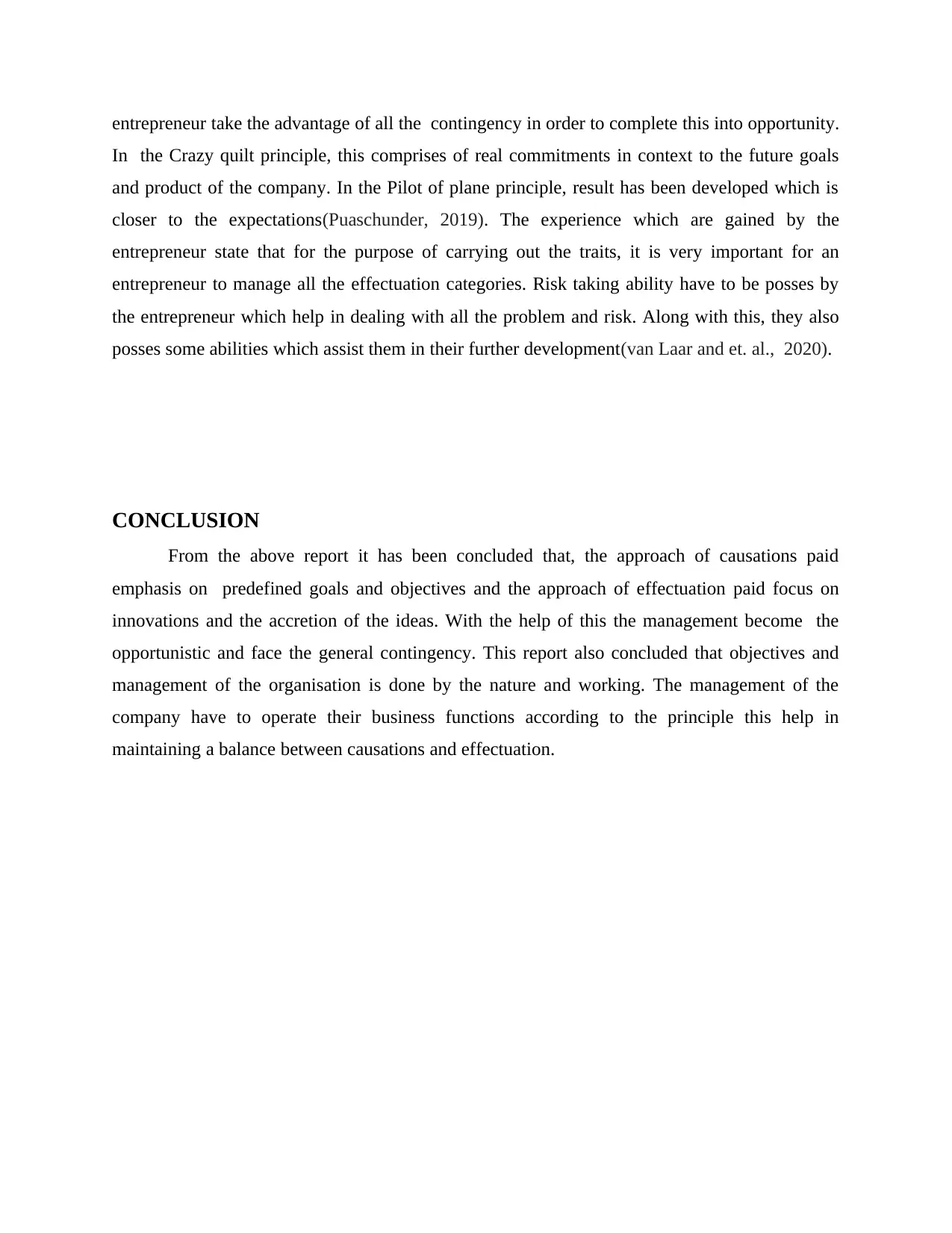
entrepreneur take the advantage of all the contingency in order to complete this into opportunity.
In the Crazy quilt principle, this comprises of real commitments in context to the future goals
and product of the company. In the Pilot of plane principle, result has been developed which is
closer to the expectations(Puaschunder, 2019). The experience which are gained by the
entrepreneur state that for the purpose of carrying out the traits, it is very important for an
entrepreneur to manage all the effectuation categories. Risk taking ability have to be posses by
the entrepreneur which help in dealing with all the problem and risk. Along with this, they also
posses some abilities which assist them in their further development(van Laar and et. al., 2020).
CONCLUSION
From the above report it has been concluded that, the approach of causations paid
emphasis on predefined goals and objectives and the approach of effectuation paid focus on
innovations and the accretion of the ideas. With the help of this the management become the
opportunistic and face the general contingency. This report also concluded that objectives and
management of the organisation is done by the nature and working. The management of the
company have to operate their business functions according to the principle this help in
maintaining a balance between causations and effectuation.
In the Crazy quilt principle, this comprises of real commitments in context to the future goals
and product of the company. In the Pilot of plane principle, result has been developed which is
closer to the expectations(Puaschunder, 2019). The experience which are gained by the
entrepreneur state that for the purpose of carrying out the traits, it is very important for an
entrepreneur to manage all the effectuation categories. Risk taking ability have to be posses by
the entrepreneur which help in dealing with all the problem and risk. Along with this, they also
posses some abilities which assist them in their further development(van Laar and et. al., 2020).
CONCLUSION
From the above report it has been concluded that, the approach of causations paid
emphasis on predefined goals and objectives and the approach of effectuation paid focus on
innovations and the accretion of the ideas. With the help of this the management become the
opportunistic and face the general contingency. This report also concluded that objectives and
management of the organisation is done by the nature and working. The management of the
company have to operate their business functions according to the principle this help in
maintaining a balance between causations and effectuation.
⊘ This is a preview!⊘
Do you want full access?
Subscribe today to unlock all pages.

Trusted by 1+ million students worldwide
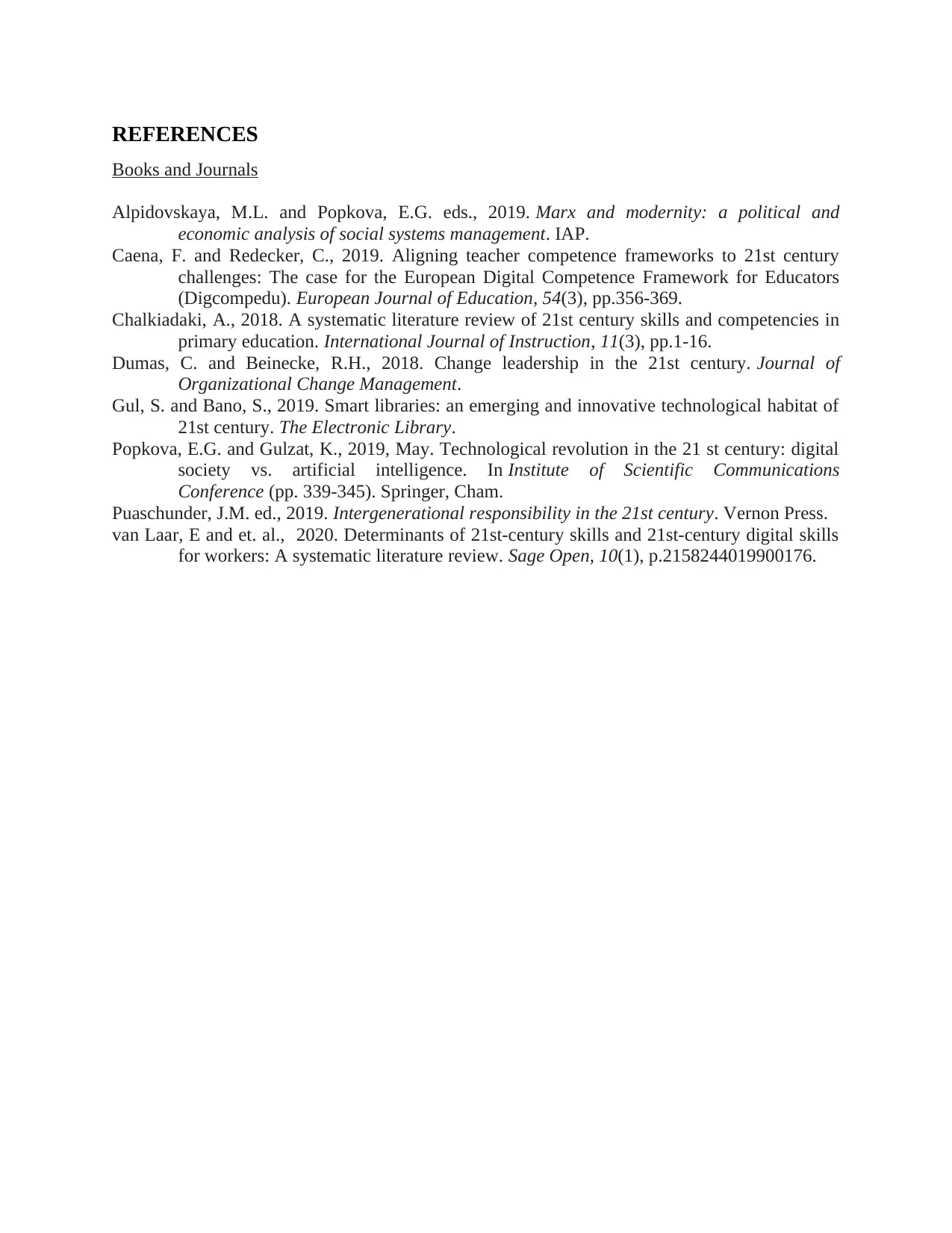
REFERENCES
Books and Journals
Alpidovskaya, M.L. and Popkova, E.G. eds., 2019. Marx and modernity: a political and
economic analysis of social systems management. IAP.
Caena, F. and Redecker, C., 2019. Aligning teacher competence frameworks to 21st century
challenges: The case for the European Digital Competence Framework for Educators
(Digcompedu). European Journal of Education, 54(3), pp.356-369.
Chalkiadaki, A., 2018. A systematic literature review of 21st century skills and competencies in
primary education. International Journal of Instruction, 11(3), pp.1-16.
Dumas, C. and Beinecke, R.H., 2018. Change leadership in the 21st century. Journal of
Organizational Change Management.
Gul, S. and Bano, S., 2019. Smart libraries: an emerging and innovative technological habitat of
21st century. The Electronic Library.
Popkova, E.G. and Gulzat, K., 2019, May. Technological revolution in the 21 st century: digital
society vs. artificial intelligence. In Institute of Scientific Communications
Conference (pp. 339-345). Springer, Cham.
Puaschunder, J.M. ed., 2019. Intergenerational responsibility in the 21st century. Vernon Press.
van Laar, E and et. al., 2020. Determinants of 21st-century skills and 21st-century digital skills
for workers: A systematic literature review. Sage Open, 10(1), p.2158244019900176.
Books and Journals
Alpidovskaya, M.L. and Popkova, E.G. eds., 2019. Marx and modernity: a political and
economic analysis of social systems management. IAP.
Caena, F. and Redecker, C., 2019. Aligning teacher competence frameworks to 21st century
challenges: The case for the European Digital Competence Framework for Educators
(Digcompedu). European Journal of Education, 54(3), pp.356-369.
Chalkiadaki, A., 2018. A systematic literature review of 21st century skills and competencies in
primary education. International Journal of Instruction, 11(3), pp.1-16.
Dumas, C. and Beinecke, R.H., 2018. Change leadership in the 21st century. Journal of
Organizational Change Management.
Gul, S. and Bano, S., 2019. Smart libraries: an emerging and innovative technological habitat of
21st century. The Electronic Library.
Popkova, E.G. and Gulzat, K., 2019, May. Technological revolution in the 21 st century: digital
society vs. artificial intelligence. In Institute of Scientific Communications
Conference (pp. 339-345). Springer, Cham.
Puaschunder, J.M. ed., 2019. Intergenerational responsibility in the 21st century. Vernon Press.
van Laar, E and et. al., 2020. Determinants of 21st-century skills and 21st-century digital skills
for workers: A systematic literature review. Sage Open, 10(1), p.2158244019900176.
1 out of 7
Related Documents
Your All-in-One AI-Powered Toolkit for Academic Success.
+13062052269
info@desklib.com
Available 24*7 on WhatsApp / Email
![[object Object]](/_next/static/media/star-bottom.7253800d.svg)
Unlock your academic potential
Copyright © 2020–2026 A2Z Services. All Rights Reserved. Developed and managed by ZUCOL.
